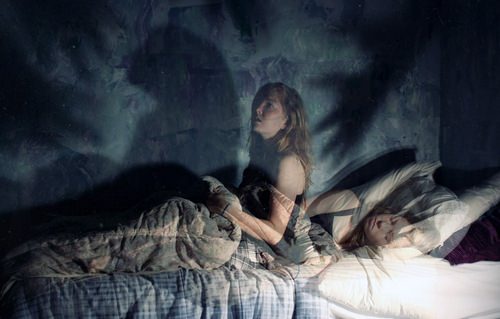How Do I Avoid Sleep Paralysis?
I want to start lucid dreaming but I have heard that it can cause sleep paralysis. I am so terrified of this happening to me! How do I avoid sleep paralysis?


Rebecca says: The short answer is - you don't! Lucid dreamers embrace sleep paralysis, they don't avoid it (which is not really possible anyway).
Sleep paralysis can be caused by a number of things: sleep deprivation, jet lag, disrupted sleep cycles, stress and anxiety, narcolepsy - and even lucid dreaming. If you want to minimize your exposure, then avoid those things. But you can't guarantee avoidance altogether; most people will experience some degree of sleep paralysis 1-3 times during their life, particularly at times of extreme stress, regardless of whether they practice lucid dreaming or not.
But let me shine a new light on this subject for you...
When Sleep Paralysis is a Good Thing
Sleep paralysis provides a gateway to lucid dreams. It's not the only way to achieve a lucid dream, for sure. But it is a reliable entry point for WILDs and OBEs.
The reason people often find it scary is because they don't understand what is happening, they fight the sensation of being paralyzed, or they have had many bad experiences in the past (of the accompanying fearsome visions) that trigger an automatic fear reaction. Once you enter the fear state, it grows.
But if you enter a state of sleep paralysis willfully, with the knowledge that you are safe and it is a fleeting entry point to the lucid dream world, it can be quite exciting. I don't want to undermine those who suffer recurrent sleep paralysis against their will - it can be one heck of a sleep disorder in its extreme. But for the majority of people, especially those who go into it knowingly and deliberately, it's just a part of their night life.
Leaving The Fear Behind
Now that you are terrified of sleep paralysis (from whatever you have heard or read), we need to un-terrify you. That's the only way you're going to be able to pursue lucid dreaming without unconsciously sabotaging your attempts.
First, understand that fear is a state of mind, especially when the source of the fear is an internally generated experience. It's understandable to fear the possibility of a car crash when the driver is speeding like a maniac. But is it worth getting anxious about one day experiencing a nightmare or bad dream, no matter how vivid?
The best way to dispel this type of fear is to educate yourself so that the sleep paralysis state is no longer unfamiliar territory. Learn the facts about SP and the best way to deal with it. This article on sleep paralysis will help.
Now, what will you do when you first encounter sleep paralysis? Here's a typical SP experience ending in a lucid dream:
You may "wake up" in your bedroom, unable to move. Something is wrong. You may hear an extraordinarily loud buzzing. You may start to float above your bed. Your immediate reaction will likely be panic, but you'll need to reign that in and firmly tell yourself this is just a dream. Instead of focusing on any negative thoughts or any particular sense of a presence in the room, go to your lucid dream intention instead. Will yourself to float out the window, singing a happy lucid song, and you are free...
What is The Real Chance of Experiencing Sleep Paralysis?
I lucid dreamed for years before encountering my first SP. Probably because in those early years I mostly pursued Dream Initiated Lucid Dreams. And when it did happen spontaneously, it wasn't bad at all - freaky, yes - but not terrifying because I was able to observe it objectively.
Later encounters were all life-defining, other-worldly experiences, I won't deny that. It can mess with your perception of what's real and what's not. I think that's why millions of people are convinced they've woken up in the night, paralyzed, to see aliens, ghosts, demons and so forth, convinced they were 100% real.
Other people, some who have never dreamed lucidly before in their lives, are subjected to nightly sleep paralysis nightmares. I really feel for them. Those experiences really must have been terrifying, without the knowledge of what was happening or how to stop it. I hope these sufferers discover how to overcome their learned fears of SP and turn them into lucid dreams.
But you do not fit into this category. You know what sleep paralysis really is, how to pass through it, and emerge the other side with lucidity. There is no reason you will ever suffer the fear of an unexplained SP experience; so that fear will never grow.
What are the actual chances of experiencing sleep paralysis while practicing lucid dreaming? I'd say reasonably low, but eventually it will happen. Research has shown that lucid dreaming - and, particularly, Wake Induced Lucid Dreams and Out of Body Experiences - does increase the chances of sleep paralysis. Certain lucidity supplements, such as Galantamine, can also increase the likelihood.
And as we have learned, this is not a bad thing at all...
Further Reading
Check out Ryan Hurd's breakthrough Sleep Paralysis: A Guide to Hypnagogic Visions and Visitors of the Night for directions on turning sleep paralysis into lucid dreams.

















